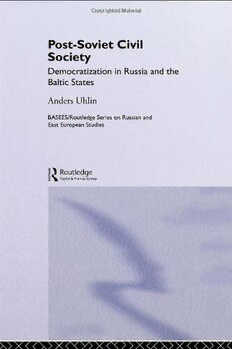
Post-Soviet Civil Society Democratization in Russia and the Baltic States (Basees Routledge Series on Russian and East European Studies) PDF
206 Pages·2006·1.522 MB·English
Most books are stored in the elastic cloud where traffic is expensive. For this reason, we have a limit on daily download.
Preview Post-Soviet Civil Society Democratization in Russia and the Baltic States (Basees Routledge Series on Russian and East European Studies)
Description:
The development of civil society has varied greatly across the former Soviet Union. The Baltic states have achieved a high level of integration with the West and European Union membership, while some regions in Russia lag far behind. Now for the first time there is a comparative study of civil society and democratization across post-Soviet national borders. Acknowledging the enormous variation throughout the region, the book offers unique data on developments in Russia, Estonia, Latvia and Lithuania. Applying an innovative analytical framework derived from theories of democratization, civil society, social movements and transnational relations, the researchers have formulated broader comparisons and generalisations without neglecting the specific post-Soviet context. The book provides a systematic comparison across sectors as well as nations, and includes chapters on NGOs, the state and conflict, and transnationalisation. Quantitative survey data is combined with qualitative interviews and case study research to both confirm previous findings about the weakness of post-communist civil society and to qualify previous research.
See more
The list of books you might like
Most books are stored in the elastic cloud where traffic is expensive. For this reason, we have a limit on daily download.
